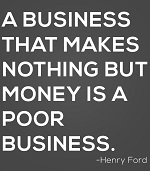The generally accepted meaning of Merchantry is "the
body of merchants taken collectively within the context of business, commerce or trade". The Merchant Class is described
on the Mercantile page of BREAKING ALL THE RULES.
This series of business essays deals with an alternative to the Corporatocracy
dominated economy that has caused a global gulag of economic serfs in a neo-feudalism of infinite propositions.
With the revamping of the federal tax system, profound changes will encourage the expansion
of transnational companies. What is not yet fully appreciated is that small businesses and individually owned enterprises
are poised to experience dramatic growth and prosperity not seen for many decades.
From a regulatory standpoint, the hurdles of compliance have lessened and the first signs of community bank lending
and capital access will improve. For the brave souls who value their independence and have the courage to become a proprietor
of their own venture, the practical opportunity to carve out a niche in the crowded field of competitive business, is promising.
Missing in the formal education of recent generations are the lessons of conducting commerce
that is usually learned with the hard knocks of experience. The axiom that a good business transaction benefits all parties
to the deal is a fundamental factor that many capitalists often forget.
Entrepreneurs view themselves as an innovator willing to take the risk of the marketplace. Not all innovation is
successful with the launching of a new product or service, because the value of repeat business is not a component in the
rush to go to market.
Merchantry is the body of knowledge, the ethical
principles and proven practices that increases the chances of developing, growing and perpetuating a profitable business.
Profit is not a dirty word. It is an accounting standard by which to gauge the viability of
the enterprise and a source of self-funding for the future. Contrast this benchmark with the sheer speculation in the financial
markets that gamble on the volatility of stocks, bonds, options and future contracts.
A merchant is in the business of creating real wealth. A day trader produces nothing of substance. A speculator is
an opportunist who only offers liquidity to a paper transaction so settlement at a price can clear the contract. The world
between these two approaches cannot be wider than the gulf between real commerce and the computer algorithms that "trade"
at the speed of light.
Beware of a society based upon private equity, derivatives
and leveraged hedge funds taxed on carried interest because it is a phony shell game, just like the fiat Bitcoin crypto currency
is built upon real money.
This collection of business columns will argue that in order to achieve a healthy economy, the emphasis of encouraging
an effective balance among privately owned business enterprises is crucial. Corporate publicly traded companies operate on
the basis of enhancing their stock price so that their value can position itself to acquire other conglomerates, provide golden
parachutes for management or to cash out the equity owners.
The actual business of conducting commerce is the primary concern for most small businesses. They are the primary
engine of a growing expansion of employment. The middle class achieves upward mobility when the prospects of gainful employment
improves in your local community.
Lest
one forgets, the public sector is not a creator of wealth. They are an end user of private money based upon taxation which
drains revenue from productive earners. Merchantry recognizes this essential distinction.
In order to attain an independent and prosperous future, the economy must shift
to a merchant dominated marketplace. Franchise operations by private individual owners will out compete corporate employee
based management.
Cutting edge entrepreneurial
endeavors have a long history of many important commercial advancements. The burning impulse to attain spectacular invention
comes from the will and perspiration of driven self-starters.
Corporations enjoy easy entry to capital. Small business has always been hindered by the limitations
of acquiring business loans. This fact can be rectified with a shift in financial policy. The disadvantage for the merchant
is that their political access does not rival the checkbook of corporate lobbyists.
This reality can be reversed when consumers and merchants join forces to demand
an overhaul in the long dysfunctional relic of what remains of a free market system. Merchantry is a state of mind
as much as a transaction register of buyer and sellers.
Classic Capitalism of a Laissez Faire nature is deceased if it ever existed in the traditional sense. However,
literal business is as old as civilization itself. Central banking, market bubbles, leveraged speculation and violations of
anti-trust consolidations are the fruits of the Corporatocracy economy.
The alternative is a robust Merchantry based upon a rational practice of long term and mutually
beneficial business deals.
James Hall
December 2017

